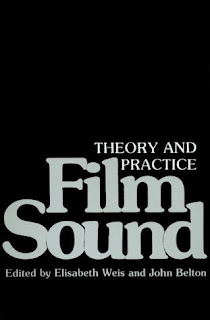[an excerpt from "Film Sound: Theory and Practice "]
"]
I think it's generally misleading to say, "Well, that sequence had eighty tracks, it must be great." Ideally, for me, the perfect sound film has zero tracks. You try to get the audience to a point, somehow, where they can imagine the sound. They hear the sound in their minds, and it really isn't on the track at all. That's the ideal sound, the one that exists totally in the mind, because it's the most intimate. It deals with each person's experience, and it's obviously of the highest fidelity imaginable, because it's not being translated through any kind of medium.
So, at a certain point, there were 160 tracks for Apocalypse. That is an awful lot, but on the other hand, if somehow I could have achieved the same effect with no tracks, I would have been more impressed. Or one track. If there had been one sound that did all of that, so mysteriously, I would be more impressed. but what that means is: thinking very, very deeply, and being very, very lucky in getting exactly the right thing. And if you can do that, then the number of tracks is meaningless. But, generally speaking, it doesn't happen very often, if ever, to get that one thing. That's just an abstract ideal that I always strive for.
I believe that there have always been sound films, since the invention of films, and there will always be silent films. You can look at television show today, or even some features, and there really is no "sound" in them. There is talking, and there's music, maybe, but the part of the brain that is interested in sound and texture and the meaning of sound as music is totally uninvolved. The sound in those films is conveying little pellets of information - the door closed, the person said this - and there's no duality, no stretching. So there are silent films today: they've got sound tracks, of course, but emotionally, they're silent.
Whereas you can look at Chaplin's silent comedies and certain other films and they depend tremendously on the sound: the sound that the wardrobe made when it fell on him. You can "hear" all of the dishes break. Those films are using sound. They're asking you to imagine the sound of things. So they are sound films, even though they are completely silent. You try to track yourself along the boundaries between those two things - that's where you swing between zero tracks and 160 tracks.
So, at a certain point, there were 160 tracks for Apocalypse. That is an awful lot, but on the other hand, if somehow I could have achieved the same effect with no tracks, I would have been more impressed. Or one track. If there had been one sound that did all of that, so mysteriously, I would be more impressed. but what that means is: thinking very, very deeply, and being very, very lucky in getting exactly the right thing. And if you can do that, then the number of tracks is meaningless. But, generally speaking, it doesn't happen very often, if ever, to get that one thing. That's just an abstract ideal that I always strive for.
I believe that there have always been sound films, since the invention of films, and there will always be silent films. You can look at television show today, or even some features, and there really is no "sound" in them. There is talking, and there's music, maybe, but the part of the brain that is interested in sound and texture and the meaning of sound as music is totally uninvolved. The sound in those films is conveying little pellets of information - the door closed, the person said this - and there's no duality, no stretching. So there are silent films today: they've got sound tracks, of course, but emotionally, they're silent.
Whereas you can look at Chaplin's silent comedies and certain other films and they depend tremendously on the sound: the sound that the wardrobe made when it fell on him. You can "hear" all of the dishes break. Those films are using sound. They're asking you to imagine the sound of things. So they are sound films, even though they are completely silent. You try to track yourself along the boundaries between those two things - that's where you swing between zero tracks and 160 tracks.
- Walter Murch


No comments:
Post a Comment